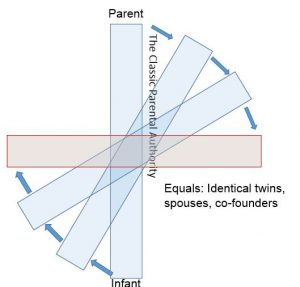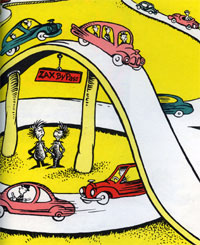Podcast: Play in new window | Download
Continuing thoughts on “paired leadership” – 2nd in an ongoing series.
As I wrote last week, in some key paired leadership situations there are pure equals, like spouses and co-founders. But sometimes your paired leader or partner is “beneath” you in the hierarchy. You are each vital to the team and organization, and of course, vital to each other. So, you can
- Help each other to greatness, or
- You can muddle-middle along on parallel tracks. But you can also:
- Make it harder for each other, make each other worse, for the work and for life, i.e., act more like adversaries than partners.
This last scenario explains why people don’t quit companies. They quit managers.* When you are “above” your partner, e.g., as a boss-to-worker, parent-to-child, teacher-to-student, police officer-to-citizen, then there are a few key lessons for generating transformational, partnership, or paired leadership. I will share these “top-down partnership” lessons in the coming weeks.
Let’s begin with the template for all hierarchical partnerships: parent-to-child. We begin a new job, as we began life itself, in huge dependency. And if the parent/boss does it right, then the child/worker grows more and more independent, becoming a truly equal partner, and possibly surpassing their “leader” upon life’s social ladders. Thus, this diagram below left shows how the empowering parent or manager is always pushing the bar towards horizontal (in the direction of the blue arrows), such that the two become peers, able to fully challenge, support, and partner with each other.

I begin with a story of how I nearly completely destroyed this ideal path to partnership. Today the story. Then in the next couple weeks I — and I hope you’ll partner along with me — will share other key insights from this nearly tragic story line. Perhaps you will recognize yourself in my story — as you have been or are a parent or boss.
I have provoked more difficulty and more pain for my daughter Kate than I have generated for any other person on the earth (and likely caused more pain for her than anyone else in the world has caused for her). This is a painful admission: Mea culpa! Mea maxima culpa! And…partnerships almost always work in this reciprocal way: No single person on the earth has prompted as much pain and defeat for me in my life as has Kate.** She has grown up (and I have grown down from my imagined heights) so that she has become my single most important and productive partner for leadership, learning and growth. We are today equals. We are the red horizontal bar, and we now gently lift each other’s side of the bar a little higher, bit by bit, always coming from and returning to equal respect. But, five, ten, fifteen years ago, if you had asked my wife, relatives — or Kate or me — if that would ever be possible, the answer would have been one of uproarious disbelief. Indeed, if she had been my direct report rather than my daughter, she would have (wisely) quit my employ a long long time ago.
Kate brought challenge. Our first and beautiful baby, she was tortured by some literally unspeakable, hours-long pain every night for about three of her first months. She cried inconsolably. Jennifer and I took turns in the basement with her, so the other could get one night’s solid sleep. Poor thing was, of course, powerless to communicate. Consequently, we were powerless to understand or try to find relief. She grew out of that pain. And grew into a marvelously driven, confident, challenging, and idealistic young person. She chose how she would dress, she asked about what she didn’t get, and she fought from a sense of justice from her earliest days. We were two lawyer-parents blessed with a budding litigator.
It didn’t feel marvelous when she asked “why?” of EVERYTHING and became more sophisticated and intellectually provocative with every passing year. Perhaps you had a child whose “terrible two’s” seemed interminable, or perhaps you have someone on your team in a permanent state of pushing back, unceasingly challenging you and everyone else. Or flipping the axis for a minute, perhaps you and your manager/partner, continually butt heads on an issue in which you are both 100% convinced you are right (but of course your manager gets to “make the call.”) Well, this was Kate and me.
I would read her the story about “The Zax” from Dr. Seuss’s BEST book, The Sneetches and Other Stories. The north going Zax and south going Zax meet in the middle and neither will budge. So this on the left was us:

And then this was us ⇒
As family and world bent around us, we did not budge.
In one struggle over who-knows-what, we were face-to-face in the driveway. I denied her car keys until the issue was resolved. After 30 minutes, her sister and friends went back in the house til the standoff ended.
I will stop here for now, mindful of your time, curious about your thoughts. I had the position of authority, so why did I (a reasonably smart guy, with a decent amount of self- and other-awareness, steeped in theology, psychology, and politics) fail so epically to “lead with my best self?” What is the central challenge, do you think, in creating powerful partnerships with those “beneath” us (who may vex us)?
I’m curious about your honest take on when (if?) you have been in such straits: What could or should you have done? Why were you like me stuck and ineffective? And what got you unstuck? So, please do comment. I’m curious about the lessons you have learned, grappling with how to partner when you have greater power but aren’t using it well,
leading with something other than
Your best self.
*A 2015 Gallup study of over 7,000 American adults found that over half had quit a job because of their boss. Conversely, those who felt their boss was approachable were among the most engaged of workers; managers accounted for 70% of the variation in employees’ reported levels of engagement.
**A word about verb choices: I wrote that she and I “prompted” or “generated” bad feelings in each other. I do not use the word “caused.” Because I allowed Kate’s behavior to hurt and defeat me. She “triggered” me or “incited” me, yes, but the launching point for this column and those to come is that I had to (failed to) be responsible for my own responses to her behaviors. Way too often I did not “respond with my best self,” but “reacted” with an instinctive, fearful self. So, in these opening sentences I do not BLAME Kate for my difficulties; I was responsible, although, obviously, it took — is taking — me years to figure out how to respond constructively, intentionally, and lovingly.

Dan, while this is a powerful personal (the MOST personal we can get as parents) I think you swerved off the leadership road by conflating parenting and business leadership. For in parenting we are worried about and directly responsible for this precious life – not just any life either – from your own loin. Parented wrong and their life will/could be in danger. In business and in other life leadership it doesn’t warrant (or want) this level of primal emotion. However, I want to say we don’t get parenting manuals (although the Bible is IT for fathers; not mothers as He gave them that ability intuitively) and you did what you thought was best for your daughter at that moment. As a parent as they grow it takes more of an “event” to get our points across. This is why we have children for life – for them to grow and have THEIR children and see the solemn responsibility WE HAD when they were unable to fend for themselves and survive alone in this hard and dangerous world. A chance for then to modify our techniques for the better in their own child raising. And a chance to one day understand that they couldn’t have been loved by anyone MORE than we parents (except possibly by God). I, too, was not the perfect parent (show me them) but I’m still working toward it and I have many years left to get there, I pray. But I and you were the MOST perfect parents for our child. Never forget that. Parent with your Loving Self.
Hi Jon,
Thanks for your thoughts, so much of which resonates with my own experience. Perfection is a foolish pursuit; you are sure right about that.
Kids certainly are different as you say by virtue of the things you point out — blood, pure dependency, and a lifelong relationship.
I hope to expand intelligently on two things in the future columns: why parenting IS (more than) a good metaphor for being a manager, teacher, mayor, etc. And, I will challenge the prevailing (and biblical) notion that you offer, that “This is why we have children for life – for them to grow.” I think we have children for life, as least as much for us to grow. This is where partnership becomes transformational.
From a Christian perspective, as you have raised it, I believe it is why Jesus came as an infant, and why in turn he said, “Unless you become like one of these [children], you shall not enter the kingdom.” To put it differently, Jesus IMHO was saying, when “you meet the child, you meet ME.” So, although we are surely there for the benefit of the child, we are given infants and children in order for us to meet life, and to meet God Him/Herself.
Thanks again for taking time to kick of the comments this week. (It’s nice not to have a D vs R argument every time 🙂 ).
D.
What your story and topic made me think of first was humility and societal roles/viewpoints of positions of power. I cannot help but feel that even those people given the most adaptive characteristics/personality to make the best of such top-down partnerships feel some tug towards what society makes of it.
I am still young and have not been a father and realize I cannot fully understand yet what your position was but comparing it to boss-worker situations as you have done I can understand it is possible that some values or ideals about what a father should be and should be seen as influenced your actions. What I mean is, in any role, be it father, boss, coach, etc., we have some sort of unconscious force that acts on our actions arising from our life experiences (i.e. the values we embed within ourselves over time that can seem to come naturally).
With no perfect human in existence (my opinion), I believe the nearest to perfection we can come is to do what you are doing and reflect on improvement and not perfection.
Yes, Kenny. I agree that there is “some sort of unconscious force” (I’ll keep exploring this in future blogs) that acts on us. We have some deep inner templates that say we must assert our power and rightness. Maybe that wiring was necessary in cultures/environments where risk was omnipresent and there wasn’t time to discuss and to allow emotions a role. But I don’t think most of us live under those earlier evolutionary times. We do have time — to slow, to deliberate, to express feelings, rather than to act on old wiring that tends to the “dominance” that David discussed (and I think you are noting) above.
D.
I’m not sure if this is your case but it seems to me that there are two types of people that seem to have the power to affect us the most. 1. Those we are polar opposites of. This seems intuitive these can be the people we don’t quite understand or need to work the hardest to see their perspective. 2. Those most like us. This may seem counterintuitive but it is not those that agree with us but those individuals who reason and think most like us, and at times take an opposite position. Our children or often at least one of them fall into this camp and can often beguile. One thing we often see in them is our greatest faults and how we want to help avoid them avoid these pitfalls. We are battling over the same hallowed ground of our deepest convictions.
Kevin,
Love your comment. I think my daughter Kate was both very UNLIKE me — more rational, objective, etc. — and very LIKE me — strong-willed. So, in some ways I was challenged by BOTH!
And what a great line, “We are battling over the same hallowed ground of our deepest convictions.” I think we both felt that way; it is why we argued. But then we felt like the players in the old political line, “never fight with a pig because you both get dirty, but the pig likes it.” In our case neither of us took joy in it. But there we went!
Thanks for weighing in.
dan
Thank you, Dan, for this most powerful entry and for sharing your personal story. Each of us is a parent or a child, or both, so it was easy to identify with much of what your wrote. I think that we have a subconscious drive to dominate others, in order to feel powerful. This means that others must recognize and respect our authority. There is something viscerally abhorrent when one’s child “defies” (how we feel it) us. And we often react badly, even though our children’s behavior is part and parcel of their personal growth, independence and self-esteem. No one – a child, a teenager, and adult – wants to feel dominated…whether it’s by a parent early in life or a boss at work. Parenting and leading at work are works in progress, as long as we are open to learning and adapting.
David,
Thanks as always for a thoughtful comment. I so agree with this line: “I think that we have a subconscious drive to dominate others, in order to feel powerful.” I will write more about this in the next installment. For, I both agree, but then have to ask and wonder: What would a 160-pound, 40-year old man NOT feel powerful in the face of an 80-pound 4th grader. Right?
I COMPLETELY agree with you that NOBODY wants to feel dominated, so when “dominance” is the signal we are sending, we are sure to generate some form of fight or flight, rather than healthy engagement.
I think we have to push hard on your first wonderful observation and the question I am asking: Why in the world would we feel we are at risk of losing our power?
Onwards,
Dan